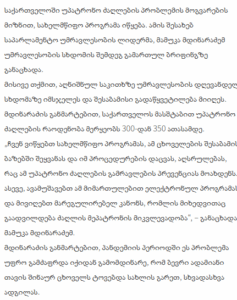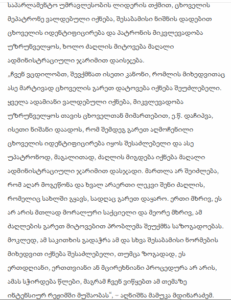

A state program is being launched to address the problem of stray dogs in Georgia. The leader of the parliamentary majority, Mamuka Mdinaradze, announced this at a briefing after the majority session. According to him, the issue was discussed at today’s majority session and a corresponding decision was made. According to Mdinaradze, the number of stray dogs across Georgia ranges from 300 to 350 thousand. “We are launching a state program to enter these animals into the appropriate databases and to observe and enforce procedures that will prevent the proliferation of these stray dogs. We will also develop an electronic program in this direction and adopt a regulatory law that will facilitate the traceability of the dog owner,” said Mamuka Mdinaradze. According to Mdinaradze, this problem has become more acute during the pandemic due to the fact that many people have been leaving their pets outside the home, in various places. According to the parliamentary majority leader, the owner of the animal will be obliged to identify the animal with a suitable tag and ensure the traceability of the owner, while abandoning the dog will be punishable by a high administrative fine. “We are trying to create a law according to which it will be impossible to leave an animal outside so easily. Every person will be obliged to ensure traceability in relation to their animal, so-called chipping, to put a mark so that it is possible to identify the animal found outside later, and abandoning a dog without a guardian like that, for example, will be punishable by a high administrative fine. It is really impossible that you no longer like it and tomorrow you throw several puppies of your dog that you have at home somewhere outside. On the one hand, this is not entirely moral behavior, and on the other hand, leaving these dogs outside creates a problem for society. In short, this issue will be resolved according to these and other relevant norms, although in general, this is not a one-day, one-month or short-term procedure, it takes years, but we are starting to work intensively on this issue,” Mamuka Mdinaradze noted.
